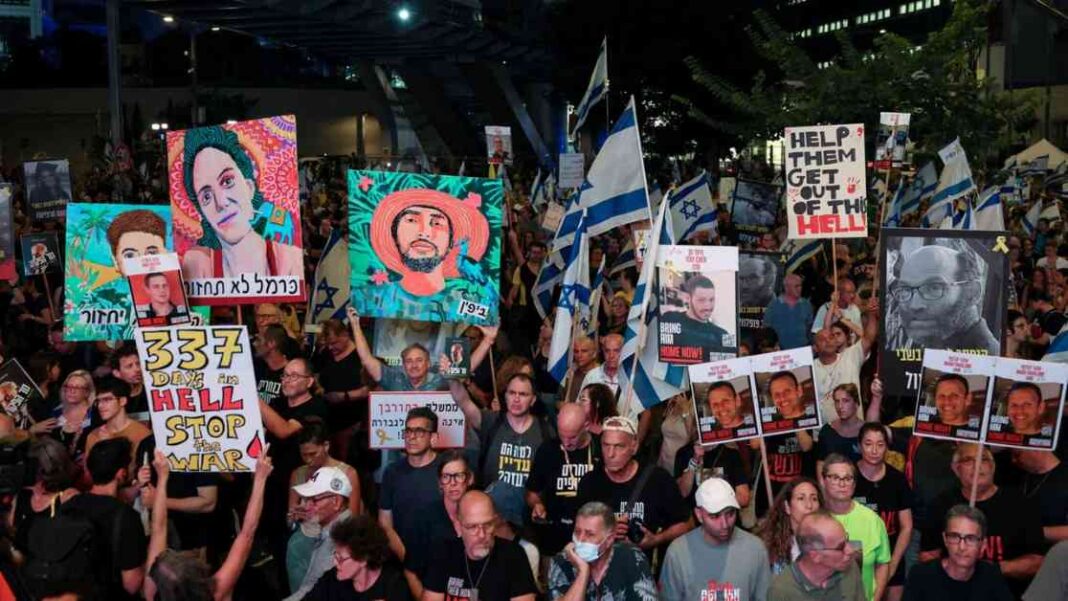Israelis Protest Against Netanyahu’s Policies: A Detailed Analysis
Mass protests have once again erupted in Israel amidst the backdrop of the Gaza conflict, with hundreds of thousands of people taking to the streets to demand an agreement with Hamas for the release of approximately 100 hostages. Reports from the media indicate that organizers claim up to 500,000 demonstrators gathered in Tel Aviv alone.
The recent demonstrations stem from the stalled negotiations for the release of hostages, leading to growing discontent among the Israeli population. The protesters expressed their frustration with Prime Minister Netanyahu’s handling of the situation, calling for swift action to secure the safe return of the hostages held by Hamas.
„We cannot sacrifice any more lives, we cannot sacrifice them,“ a relative of Carmel Gat, a hostage killed by extremists, declared at the rally. „Their time is running out.“ The tragic deaths of Gat and five others at the hands of Hamas terrorists have fueled the public outcry, with many pointing fingers at Netanyahu for failing to secure a deal that could have potentially saved their lives.
The brutal attack by Hamas and other Islamist terror groups on southern Israel last October resulted in over 1,200 deaths and the abduction of around 250 individuals as hostages in the Gaza Strip. This heinous massacre served as the catalyst for the Gaza conflict, which has claimed the lives of more than 40,930 people in Gaza since its inception.
Efforts to negotiate the release of the hostages have hit a deadlock, with the United States, Egypt, and Qatar serving as mediators in the indirect talks. The proposed multi-stage agreement aims to not only secure the release of the hostages but also bring an end to the conflict, facilitate the withdrawal of Israeli forces from the Gaza Strip, and release thousands of Palestinian prisoners from Israeli jails.
Critics have accused Netanyahu of sabotaging the potential agreement by imposing unreasonable demands, thereby obstructing progress in the negotiations. Netanyahu’s coalition government, which includes right-wing extremists opposed to concessions to Hamas, has threatened to dissolve if he compromises on their hardline stance.
Recent reports from US media suggest that a final proposal for an agreement is on the table, raising hopes for a breakthrough in the negotiations. However, if both parties fail to accept the terms of the proposed deal, it could spell the end of the negotiation process, leaving the fate of the hostages hanging in the balance.
Challenges and Complications in Negotiations
The intricate nature of the negotiations between Israel and Hamas has presented numerous challenges and complications, making it difficult to reach a mutually acceptable agreement. The diverging interests and demands of the two parties have created significant roadblocks in the negotiation process, with each side unwilling to compromise on key issues.
The issue of prisoner releases has been a particularly contentious point of contention, with Israel hesitant to release Palestinian prisoners accused of terrorism for fear of endangering its security. On the other hand, Hamas insists on the release of all Palestinian prisoners as a precondition for any agreement, further complicating the talks.
Moreover, the presence of external mediators, such as the United States, Egypt, and Qatar, has added another layer of complexity to the negotiations. While these mediators have played a crucial role in facilitating communication between the two parties, their involvement has also introduced competing interests and agendas that must be navigated to reach a consensus.
The political dynamics within Israel have also played a significant role in shaping the negotiation process, with Netanyahu’s coalition government facing internal pressure from right-wing factions opposed to any concessions to Hamas. This internal division has hindered Netanyahu’s ability to make meaningful progress in the negotiations, as he must balance the demands of his coalition partners with the need to secure the release of the hostages.
Overall, the challenges and complications in the negotiations highlight the complexity of the situation and the delicate balance that must be struck to achieve a successful resolution to the hostage crisis.
Impact on Israeli Society
The ongoing hostage crisis and the stalled negotiations with Hamas have had a profound impact on Israeli society, stirring up emotions of anger, frustration, and grief among the population. The sense of helplessness and vulnerability felt by many Israelis has fueled the widespread protests and calls for action to secure the safe return of the hostages.
The tragic deaths of Carmel Gat and the other hostages have struck a chord with the Israeli public, serving as a stark reminder of the high stakes involved in the conflict with Hamas. The sense of loss and mourning that permeates Israeli society has galvanized people to take to the streets in protest, demanding accountability from the government and a swift resolution to the crisis.
The prolonged conflict with Hamas and the hostage crisis have also taken a toll on the mental and emotional well-being of many Israelis, leading to increased anxiety, stress, and trauma. The uncertainty surrounding the fate of the hostages and the lack of progress in the negotiations have left many feeling disillusioned and despondent about the future.
Despite these challenges, the resilience and unity displayed by the Israeli people in the face of adversity have been a source of inspiration and hope. The solidarity shown in the mass protests and the unwavering determination to secure the release of the hostages demonstrate the strength of the Israeli spirit and the collective resolve to overcome any obstacles in the pursuit of justice and peace.
In conclusion, the protests against Netanyahu’s policies and the demands for a resolution to the hostage crisis underscore the deep-seated concerns and frustrations within Israeli society. As the negotiations continue and the fate of the hostages hangs in the balance, it is essential for all parties involved to prioritize the safety and well-being of the hostages and work towards a peaceful and equitable resolution to the conflict.















